
As smart technology slowly permeates all aspects of our lives, from smart lighting to smart entertainment and appliances, our homes are becoming increasingly interconnected, and smart heating controls are part of this evolution. These sophisticated smart heating systems, which allow homeowners to manage their heating remotely and more efficiently, are a popular choice not just for their convenience in home automation but also for energy conservation.
Smart heating controls are a significant leap from traditional thermostats. By enabling users to adjust their home’s temperature from any location, at any time, these devices offer unparalleled control over domestic energy use. As energy prices fluctuate and environmental concerns mount, the ability to fine-tune your home’s heating to match your preferences can lead to substantial energy savings and a reduced carbon footprint.
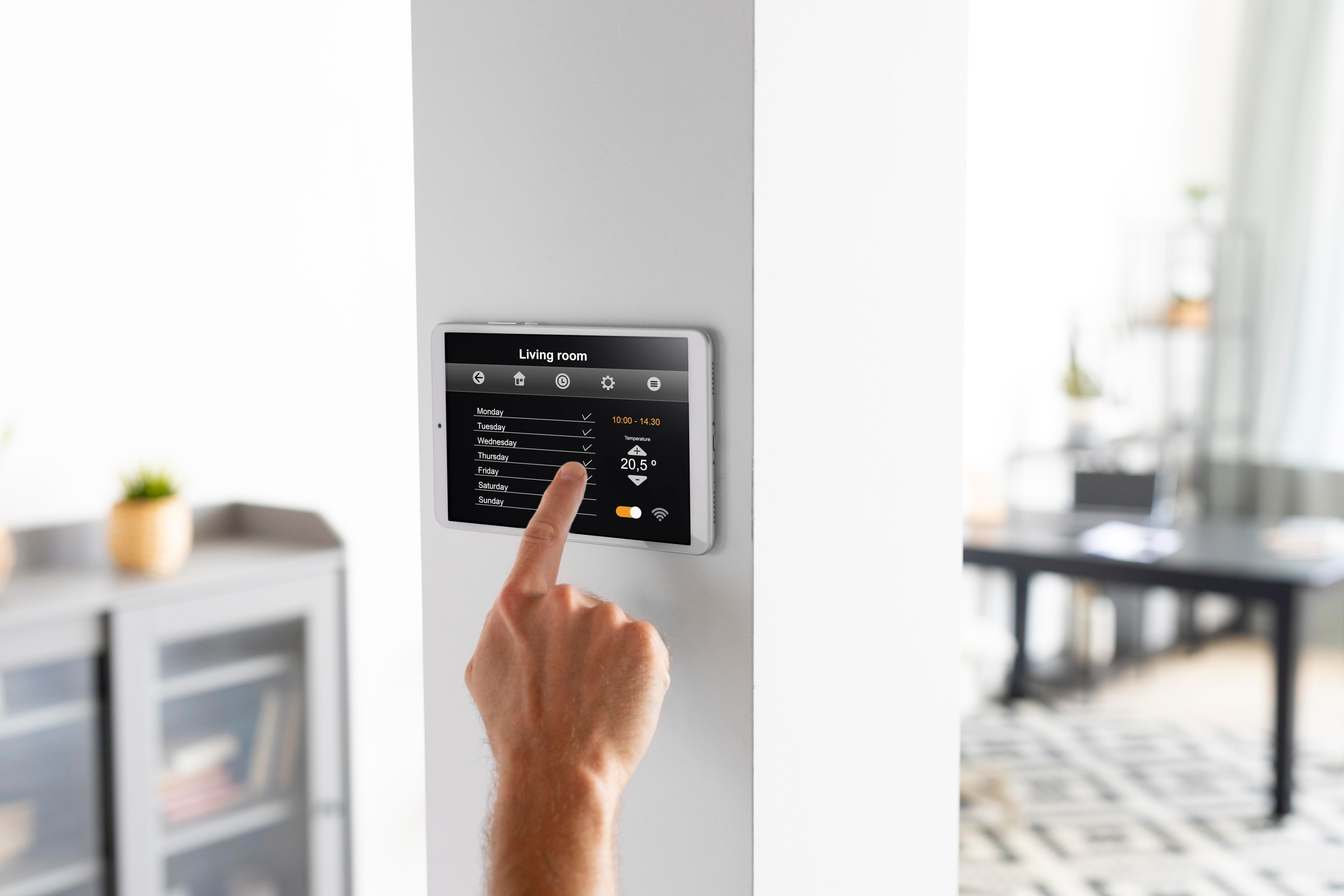
Smart heating controls are at the forefront of conscious and connected living. In this blog, we will explore a bit more about this smart technology that is transforming our day-to-day lives and has a positive impact on the environment.
Smart heating controls are part of an advanced heating system technology that is designed to manage the heating of a home or business more efficiently and intelligently than traditional methods. These controls encompass a range of devices, from smart thermostats, sensors and software, all integrated to provide real-time adjustments in a home heating system based on factors such as occupancy, weather and user preferences.
At its core, a smart heating system is a networked system capable of remote and automated control of home or business heating. Unlike standard thermostats that require a physical presence and manual adjustment, smart heating controls allow users to program and adjust their home’s temperature settings through a smartphone app, web interface or even voice commands. These systems can learn from your behaviours, adjust to real-time environmental changes, and even provide energy usage analytics to help you optimise your heating consumption.
Traditional heating controls typically involve a manual thermostat that requires users to set and adjust the temperature physically. These systems operate on a set-it-and-forget-it principle, lacking the ability to adapt to variations in occupancy or environmental conditions unless manually adjusted.
In contrast, smart heating controls offer:
In essence, smart heating controls represent a significant advancement over traditional thermostats, offering enhanced efficiency, convenience, and control. By intelligently integrating technology into the fabric of our homes, they pave the way for a more sustainable and comfortable living environment.
The terms ‘smart heating control’ and ‘smart thermostat’ are often used interchangeably, but in fact they can refer to different aspects of a smart heating technology. Here’s a quick overview:
A smart thermostat is a device that can be programmed and operated remotely for heating and hot water control throughout your home or office building.
Smart heating control is a broader term that encompasses smart thermostats and other devices and systems used to control the heating in a home or business intelligently.
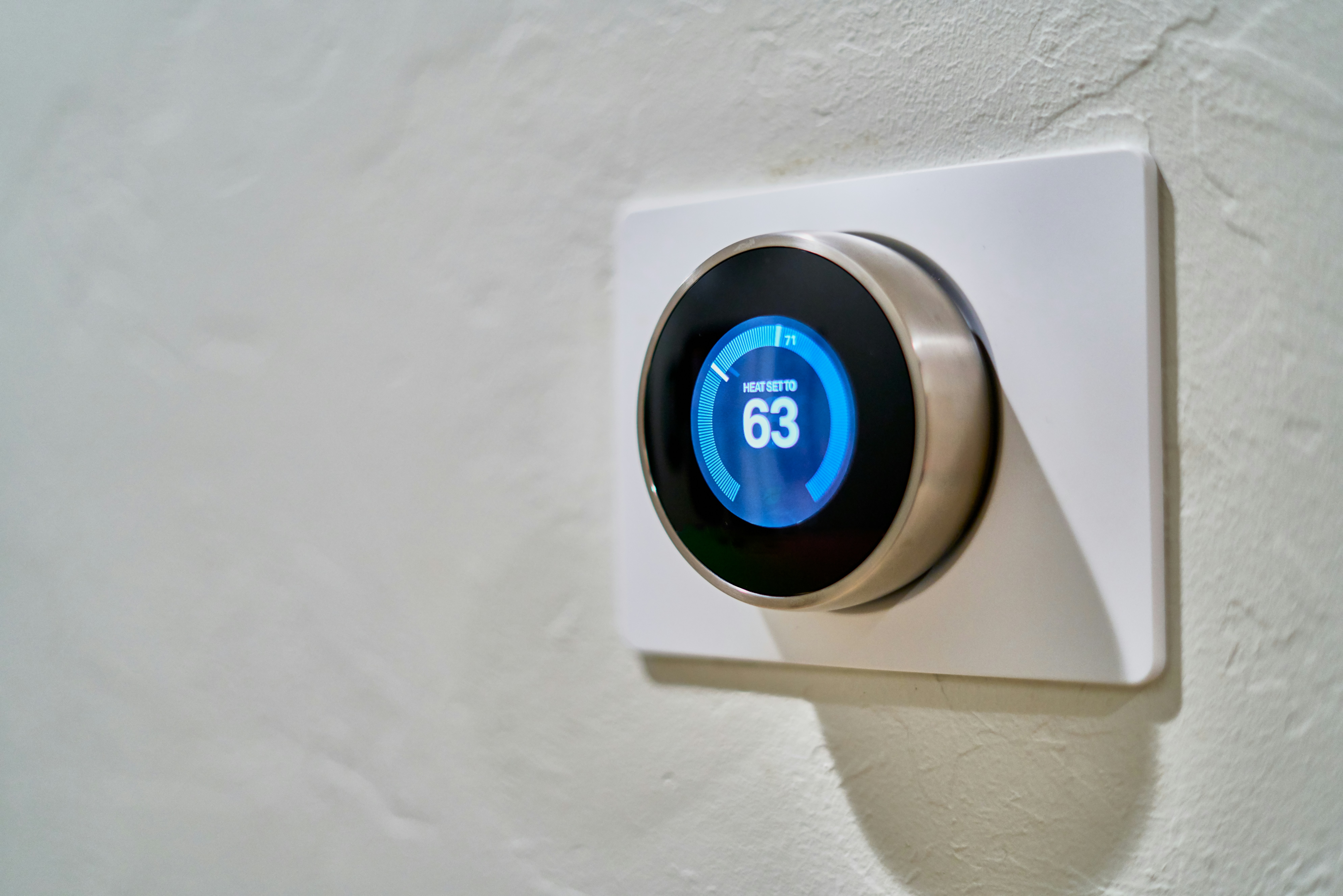
Smart heating controls represent a significant advancement in home heating technology allowing homeowners to control heating systems remotely and intelligently with smart features.
Here’s a closer look at the technology behind smart heating controls:
Smart Thermostats are the central control units for smart heating systems. They replace traditional thermostats and can be programmed and adjusted remotely. Smart thermostats can learn your schedule and adjust the heating accordingly, ensuring your home is warm when you need it to be and conserving energy when you don’t.
Zone-based heating allows different areas (or ‘zones’) of your home to be heated to different temperatures. It is particularly useful in larger homes where heating needs can vary widely from room to room. Zone-based systems use multiple smart thermostats or individual radiator controls to manage the temperature in each zone independently, offering significant energy savings and personalised comfort.
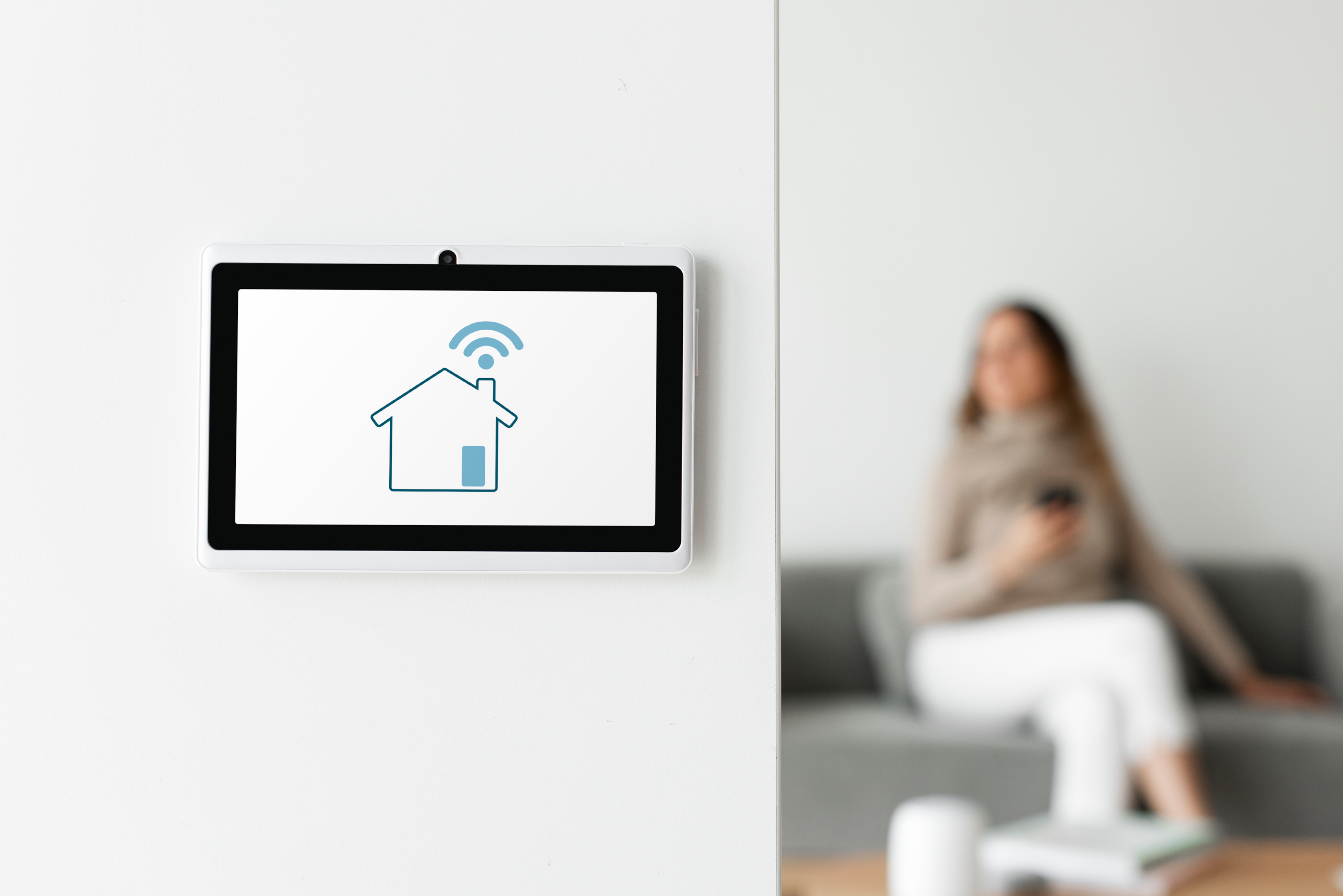
The short answer is yes, most people can install smart heating controls in their homes, but the compatibility and installation process can vary depending on the existing heating system and the specific requirements of the smart heating device.
Here’s how it generally works for different types of heating systems:
For homes with central heating, smart thermostats can usually be integrated quite seamlessly. The smart thermostat replaces the traditional thermostat and connects to the central heating system to control the boiler. It is important to ensure that the smart thermostat is compatible with the specific type of central heating system you have, whether it is gas, oil, electric or heat pumps.
Smart controls can also work with underfloor heating systems, both electric and water-based. The integration process might be a bit more complex compared with standard central heating systems, especially if you want to control different zones independently. However, many smart thermostats are designed to work with underfloor heating, allowing for efficient and precise temperature control.
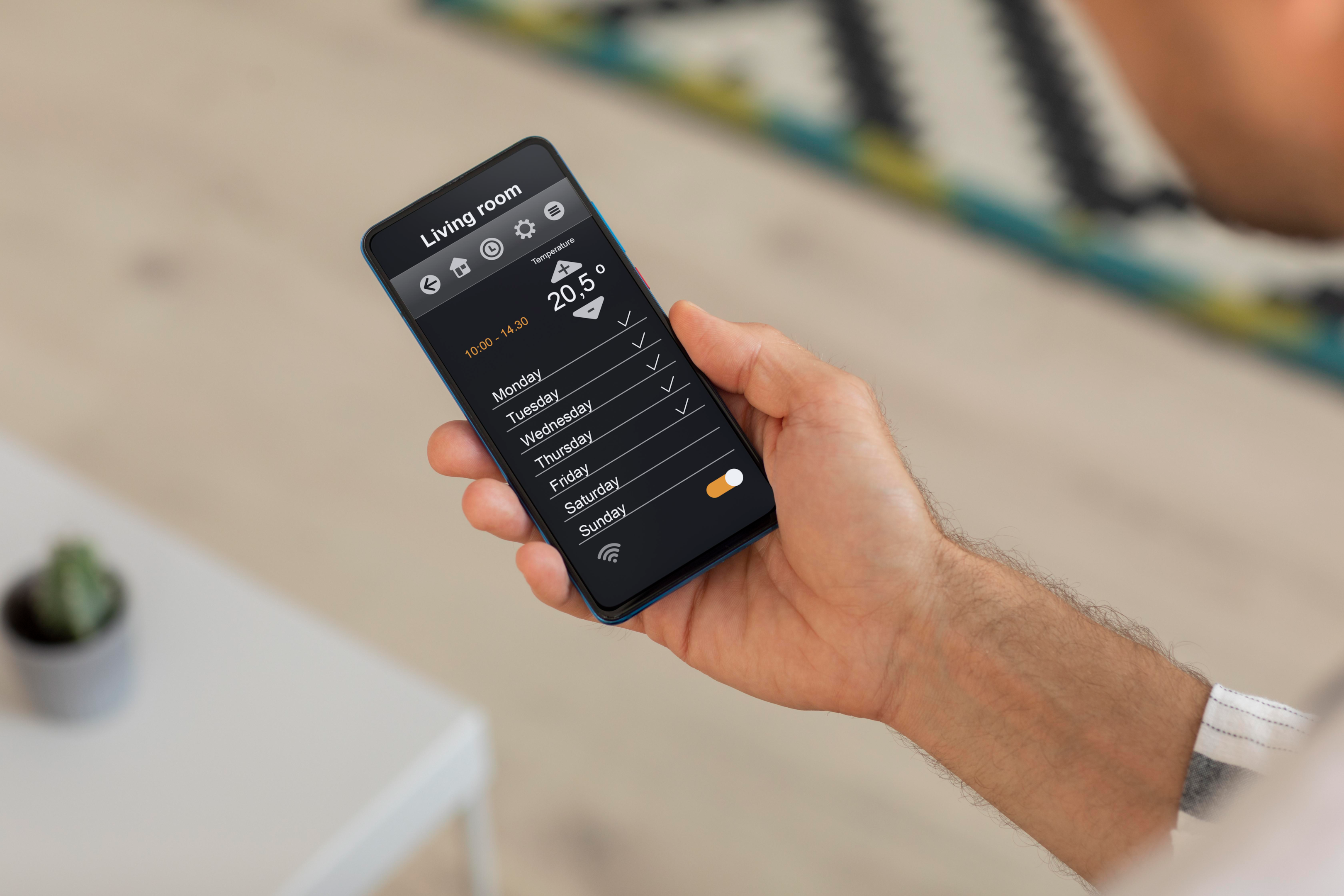
Smart heating controls add a layer of intelligence to conscious living allowing for more control over your home’s heating.
There are several benefits to upgrading your home to smart heating systems. Here are a few:
As we have already discussed, smart heating controls are designed to optimise your home’s energy usage, significantly reducing waste and lowering your energy bills. These systems intelligently adjust the heating based on various factors, such as your presence in the home, the specific rooms in use and the external weather conditions. For example, smart thermostats can change your schedule and heat your home just before you arrive, ensuring it is warm when you need it and conserving energy when you are out. Additionally, the ability to control the heating remotely means you can turn off the heating if you forget to do so when leaving home.
One of the primary benefits of smart heating controls is the unparalleled level of convenience they offer. You can adjust your home’s temperature from anywhere, at any time, using a smartphone or voice commands. This remote access takes away the need to physically interact with the thermostat, providing an easy and convenient way to ensure your home is always at the ideal temperature.
Smart heating controls are equipped with advanced algorithms that enable them to learn from your behaviours and adjust settings to suit your preferences. Over time, these systems can identify patterns in your schedule, such as when you typically leave or return home, and adjust the heating accordingly. This means that over time the system becomes more efficient and tailored to your lifestyle and routine without requiring constant manual adjustments.
By optimising energy use and reducing waste, smart heating controls have a positive impact on the environment. Lower energy consumption means fewer greenhouse gas emissions, contributing to a reduction in the overall carbon footprint of your household. At a time when environmental sustainability is increasingly important, adopting smart heating controls is a relatively easy and practical step individuals can take to make their homes more eco-friendly.

Smart heater controls even come recommended by the Money Saving Expert website. In the UK, the cost of smart heating controls varies, with basic models typically starting from around £100 to £150, while more advanced systems with additional features like learning algorithms, geofencing, and room sensors can cost between £200 to £300 or more. Professional installation will add extra expense to this and for peace of mind, it is always worth having it done properly, though some users opt for DIY installation to save costs.
On the whole, though, it is important to note that these devices can lead to significant energy savings over time, quickly offsetting the initial investment. Additionally, various energy-saving incentives in the UK can also reduce the overall cost, making smart heating controls a financially viable option for many homeowners.
When selecting a smart heating control system, there are several key factors to take into account to ensure that you choose a system that meets your needs, is compatible with your existing heating system, and offers the features that are most important to you.
Before you set out to invest in a smart heating control for your home heating system, take into consideration the following things.
Ask yourself the question, what are the main features you’d like your smart heating controls to have? There are basic and more advanced models on the market.
Budget is a major factor for homeowners when it comes to upgrading their home comforts. Think about the following:
In the UK, the market for smart heating controls is diverse, offering a range of options that cater to different preferences and requirements.
According to research done by Heatable, these are the most popular heating controls currently available (but other smart thermostats and smart heating controls are also available):
A frontrunner in the smart thermostat market, the Nest Learning Thermostat is known for its sleek design and intelligent features. It learns your heating habits and adjusts the temperature automatically, serving your comfort while saving energy. Its integration with Google Home allows for voice control and connectivity with any other smart device.
Developed by British Gas, Hive Active Heating is a popular choice in the UK, offering remote control of your heating system via a smartphone app. It is user-friendly, easy to install, and compatible with most UK heating systems, making it a versatile option for many homes.
Tado stands out for its geofencing feature, which adjusts your heating based on your location, ensuring energy efficiency throughout your home without compromising on comfort. Its sleek design and intuitive app interface make it a favourite among tech-savvy users in the UK.
This system offers sophisticated zonal control, allowing you to set different temperatures in various rooms or zones within your home. Honeywell Evohome is ideal for larger properties or households with specific heating needs in different areas of the home.
Designed by Philippe Starck, the Netatmo Smart Thermostat has a sleek design but also provides detailed energy usage reports, helping you monitor and reduce your energy consumption. Its compatibility with various heating systems makes it a flexible choice for many UK homes.

This list is just a snapshot of the options available in the UK. When choosing a smart heating control, it is important to do your research and consider factors like compatibility with your existing heating system, the specific features you value, and the level of control and automation you desire. If you are unsure which way to turn, speak to a qualified heating engineer such as our experts at Mayfair Plumbers who will be able to advise you based on your circumstances.
If you are considering the installation of a smart heating control system in your home, we at Mayfair Plumbers can provide expert advice and assistance for the best options suited to your home.
Our qualified heating engineers offer professional advice on the best smart heating control systems suited to your specific requirements. They can help you understand the features and benefits of different brands and models, ensuring you make an informed decision tailored to your home’s heating system.
Our team will assess your existing heating system to ensure compatibility with the smart heating control you wish to install. They can provide insights into any necessary upgrades or adjustments required to integrate the new technology with your current setup.
We also provide expert installation services, ensuring that your smart heating control system is set up correctly and safely. Our experienced heating engineers will ensure that the installation process is smooth and adhering to all safety standards and manufacturer guidelines.
Beyond installation, we can also assist with the initial configuration of your smart heating control system. Our engineers will help set up the system, connect it to your Wi-Fi network, and ensure it is ready for remote access and control.
Should you encounter any issues or have questions about your smart heating control system, we at Mayfair Plumbers offer ongoing support and maintenance services to ensure your system continues to operate optimally.
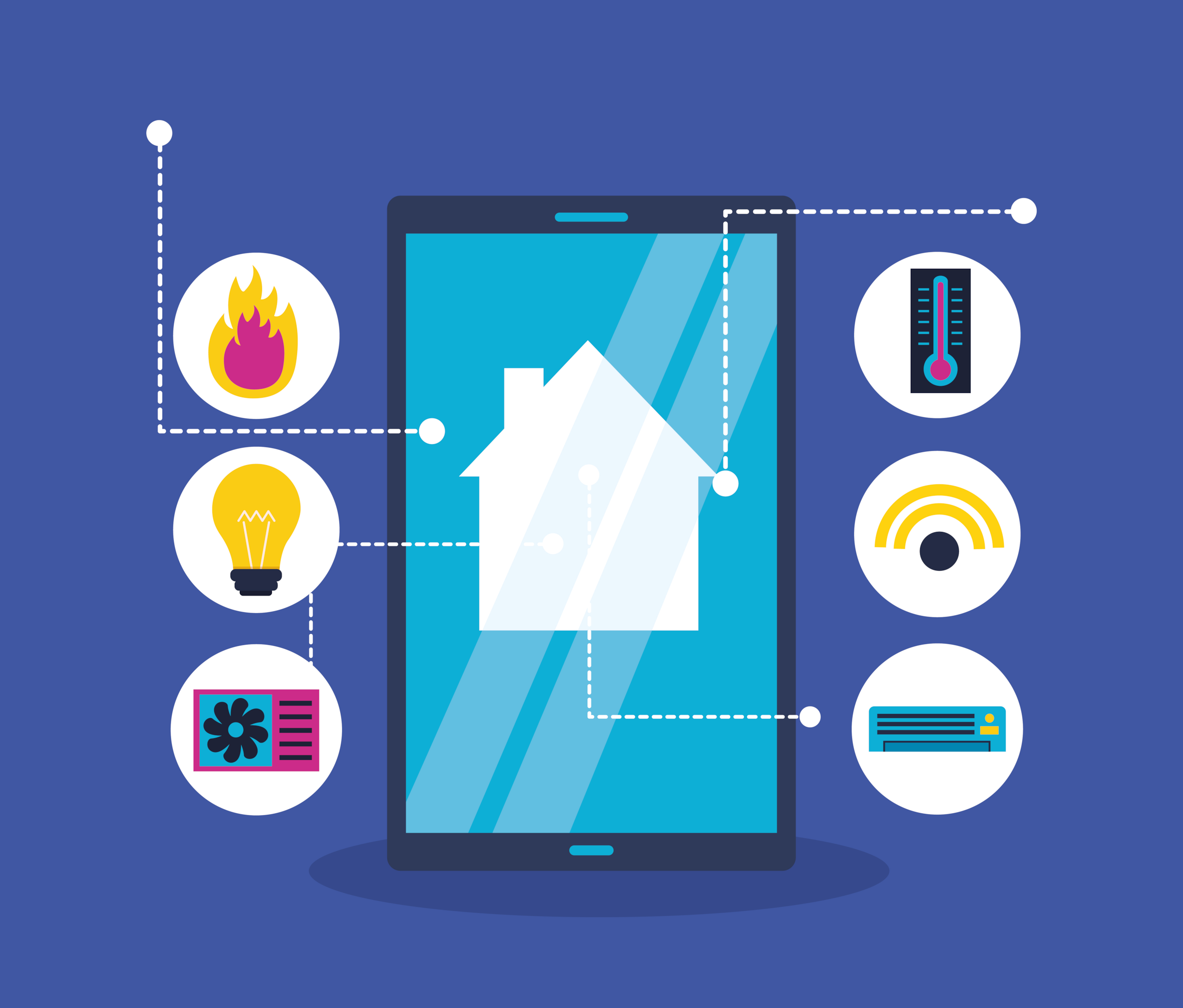
If you have any heating or plumbing-related queries, do not hesitate to contact us.
We are proud to be our customers’ choice in London and our experienced team of heating and plumbing engineers is dedicated to providing first-class services for all heating and plumbing needs. We are committed to delivering excellence and ensuring that our customers’ comfort and satisfaction always come first.
© 2025 Mayfair Plumbers Limited. All Rights Reserved | Company Number: NI680303 | VAT Number: 400286831
Website by OctopiStimuli